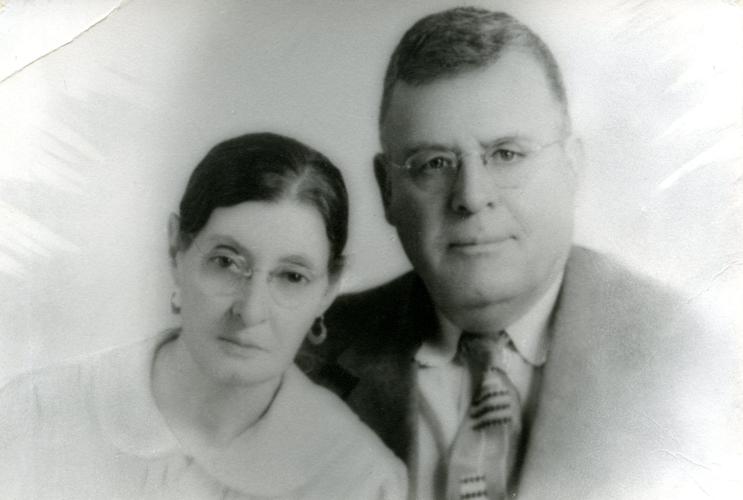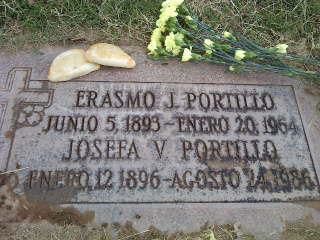As I have for the past 10 years or so, I went to Holy Hope Cemetery on Friday to visit my grandparents. It was All Souls Day.
Dozens of families were spread across the grounds. Colorful flower arrangements, both plastic and real, dotted the grave sites at the Catholic cemetery at North Oracle and West Prince roads. It was a gorgeous morning punctuated by crisp white clouds and a brilliant blue sky.
On this visit, however, I was on a mission. I went to the southern end of the cemetery to where my paternal grandparents, Josefa Villalobos Portillo and Erasmo Portillo Jurado, are buried. While I have written about my father’s parents before, I really knew little about their lives in Mexico.
My father, Ernesto V. Portillo, accompanied me to the campo santo as my family storyteller.
I wanted to know more about my abuelos. They have been on my mind a lot because of the increasing vitriol that is being thrown against immigrants. Whether immigrants come to this country with visas or walk hundreds of miles to seek safety and asylum, immigrants are easy targets for racist demagogues, starting with the president.
Because my grandparents, paternal and maternal, as well as my father, immigrated from Mexico, I take the nativist attacks personally. My immigrant family members, and the countless others I have known, were neither rapists, nor thieves, nor welfare takers, nor rock throwers.
My grandparents left Ciudad Juárez, Chihuahua, Mexico, across the line from El Paso, Texas, in the mid-1950s. They came to Tucson after my father immigrated to Tucson. Today you know it as “chain immigration,” which is under attack by the administration, and it is how many Tucsonans have immigrated.
My grandparents needed a legal sponsor. My father turned to Ausencio Ronquillo, founder of downtown’s Ronquillo Bakery, which was razed during urban renewal. Ronquillo, who came from the same Chihuahua region as my grandparents, signed the document.
My grandparents made their home in a small Armory Park apartment on South Herbert Avenue and later in a Menlo Park apartment.
My grandfather worked for the county, cleaning offices and toilets, until he retired at the age of 70. Seven months later, he died, in January 1964. I was 7 years old. My grandmother would remain in Menlo Park until she died in 1986 at the age of 90.
Their story, however, starts in the southern part of Chihuahua, the large northern Mexico state. My grandfather was born in 1893 in the ranching and mining region of Balleza; my grandmother in 1896 in the nearby region of San Francisco de Conchos. When the Mexican Revolution broke out in 1910, my grandparents and their families remained untouched by violence, my father said.
My grandfather grew up on a ranch, but after marriage and the birth of my father’s elder siblings, the family moved to the nearby town of San Francisco del Oro, an old mining town, where my father was born.
There my grandparents owned a small food store. My grandfather also built adobe houses and sold hay and alfalfa, said my father. He also delivered mail under a government contract and transported people from the town to the larger mining town of Parral.
When my father was about 12, he and a couple of his older sisters moved to nearby Parral so that my father and my tía Ernestina, the second to the youngest, could attend school. My grandparents and several of dad’s siblings remained in del Oro.
This was after World War II and life, as my father’s family knew it, would change. My grandparents and some of the family moved north to Juárez where my father would continue his secondary education in El Paso. My dad’s older siblings were venturing out on their own; three of my tías would eventually move to the Kansas City, Missouri, area.
The family disliked the large, bustling, border city. They missed the tranquility and way of life of Parral and the smaller del Oro. But opportunities were found on the border and north of it.
After finishing school, my father launched his radio career in Juárez. He wasn’t even 20 years old.
In March 1954, he took a bus to Tucson. He went to interview for a job at Tucson’s first Spanish-language radio station, KEVT. He never returned to Mexico to live.
A couple of weeks later, he wrote my grandparents to ask their permission to remain in Tucson. They consented. Two years later, they joined him.
“They had many good memories of Mexico,” my father said in Spanish. “But they were very happy in Tucson.”





